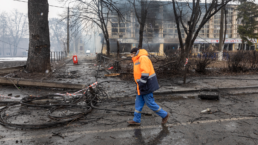Will relentless war imagery lead the people of the U.S. to reexamine this country’s militarism in this century and its role in other wars in places we’ve done our best never to see from the inside?
By Nan Levinson, Tom Dispatch
I’ve been watching this country at war for many years now and, after 9/11, began spending time with American veterans who came to disdain and actively oppose the very conflicts they were sent to fight. The paths they followed to get there and the courage it took to turn their backs on all they had once embraced intrigued and impressed me, so I wrote a book about them. While doing so, I was often struck by a strange reality in that era of American war-making: in a land where there was no longer a draft, most Americans were paying remarkably little attention to our ongoing wars thousands of miles away. I find it even stranger today — and please note that this takes nothing away from the misery of the Ukrainian people or the ruthlessness of Vladimir Putin’s invasion — that the public seems vastly more engaged in a war its country is not officially fighting than in the ones we did fight so brutally and unsuccessfully over the past two decades.

Here, for instance, are just a few notes I took recently while listening to NPR: A woman calls one of its talk shows, feeling guilty about celebrating her daughter’s birthday in style when Ukrainians are suffering so horribly. A panel on a different NPR show discusses why Americans feel so involved and its members consider all-too-uncomfortably the rationale that the Ukrainians “look like us.” The show’s host does note that they don’t actually look like all of us, but no one suggests that decrying atrocities is easier when they’re committed by another country, especially one we never much liked to begin with.
Need more? Scott Simon, a popular NPR host, concludes an opinion piece about a 91-year-old Jewish woman who survived the Holocaust and died during the siege of Mariupol this way: “Whether in Bosnia, Rwanda, Xinjiang, Bucha, Kharkiv, or Mariupol, ‘Never Again’ seems to happen again and again.” Note the absence from that list of Afghanistan, Iraq, or Yemen.
And what about that people-like-us biz? “We are all Americans,” Le Monde declared after the 9/11 attacks. Are we all Ukrainians now? And does that explain the amnesia and whitewashing of American war policy in this century — or the implicit racism of it all? There’s something odiously revealing about our tendency to divide people caught in this planet’s wars into worthy and unworthy victims, the first deserving our sympathy (of course!), the second evidently deserving their fate.
Recent Posts
New Addition to List of Nuclear Near Catastrophes
February 25, 2026
Take Action Now Debris flew for great distances — many times the distance of 270 meters to a nuclear reactor and nuclear storage facility.By David…
Gavin Newsom’s last budget belies his ‘California for All’ pledge
February 24, 2026
Take Action Now Yet, even as the state is poised to lose billions in federal funding, and millions of Californians are losing access to health care…
Israel and American Hawks are Pushing U.S. to Iran War With Catastrophic Consequences
February 23, 2026
Take Action Now At the World Health Assembly in May, member states may endorse an unprecedented strategy declaring that health is not a cost – but…
A Child’s View of the Attack on Venezuela. And a Peace Flotilla
February 23, 2026
Take Action Now Fabricio said that he and his family went out of their building and saw many people also going outside, running around, and kids…




